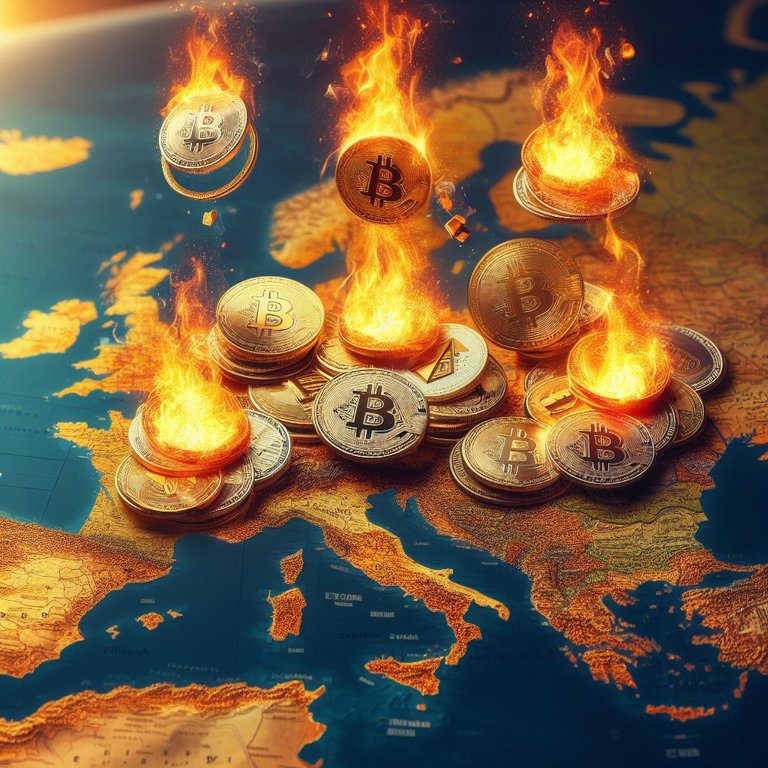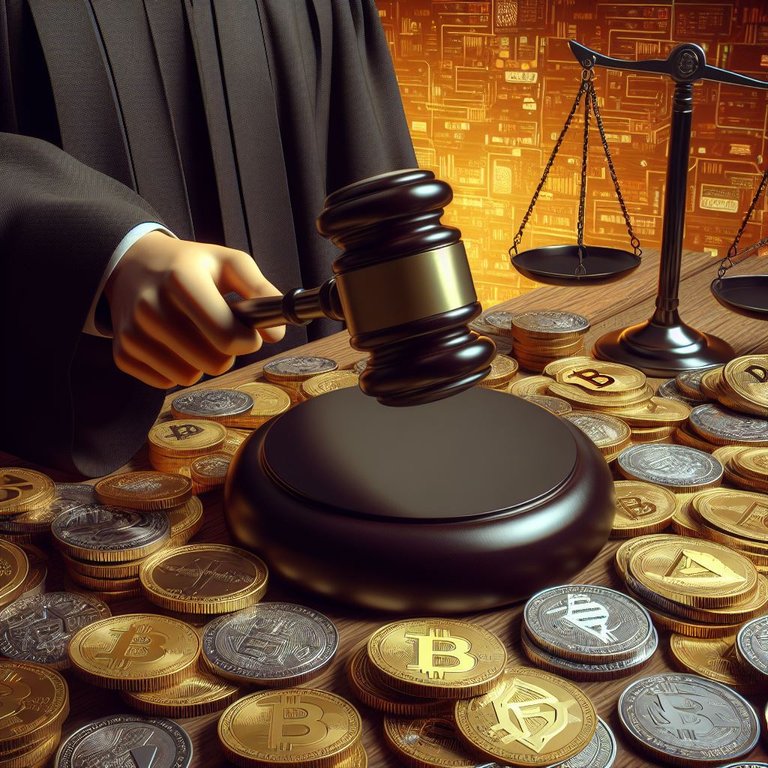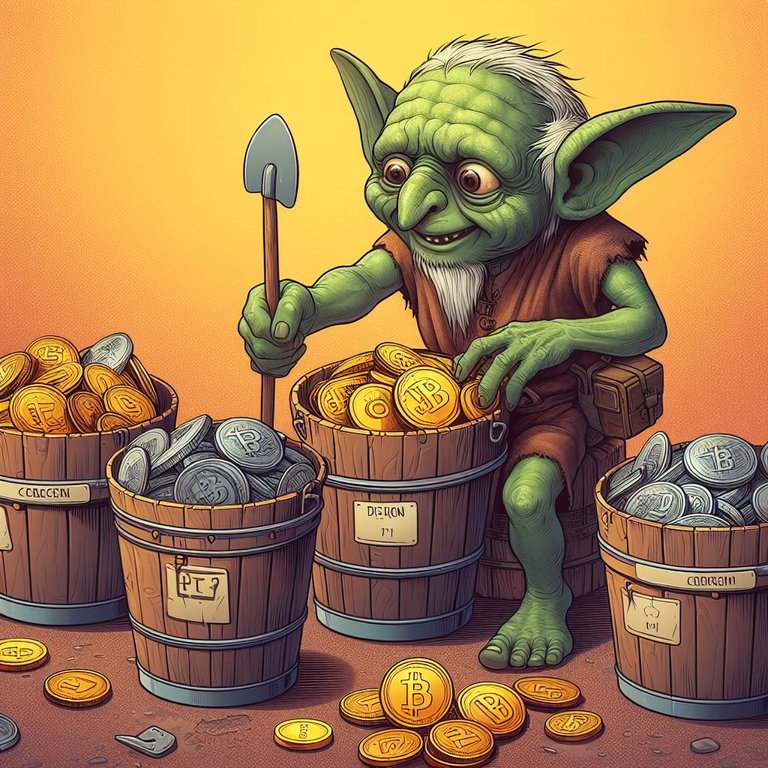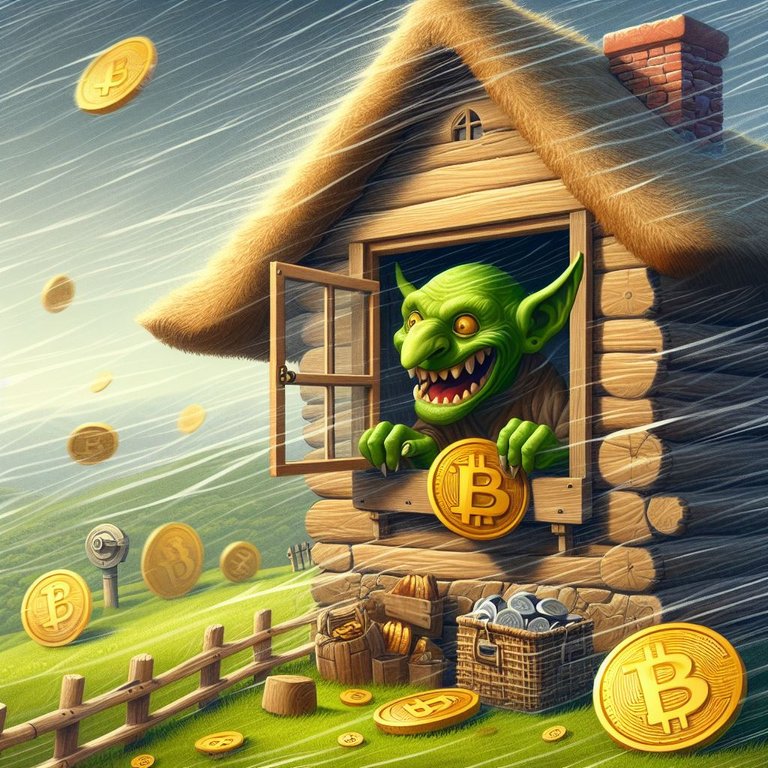Splinterlands and EU Crypto Regulation
Is Crypto under fire in the EU?
So you might have heard recently that the EU has passed Regulation (EU) 2023/1114 on markets in crypto-assets (MiCA) and they are trying to destroy crypto.
Oh no! What does this mean?
- Everyone, everywhere, is going to need KYC to do anything!
- All crypto tokens are going to be regulated away!
- It's time to panic and sell everything!
- Buy gold, then hide your gold under your mattress!
Wait. Don't panic. Let's look at what's really going on here.

First of all, I have to do this thing:
This is not legal advice. I am not a lawyer. This is also not investment advice - I am not a financial advisor. I'm just a guy that has to spend a lot of my professional life reading and interpreting regulations to help guide and focus discussions; hopefully making them more productive and to translate complex topics into simpler digestible chunks.
What is this about Regulation?!?

The Regulation aims to establish uniform rules within the European Union (EU) financial services sector for issuers of crypto-assets and service providers. The main goals are:
- to provide legal clarity,
- foster innovation
- increase confidence in financial stability for crypto projects, and
- protect investors from risks
This initiative is part of the digital finance package introduced in September 2020, aligning with efforts to enhance anti-money laundering measures and counter-terrorism financing, contributing to a secure financial environment within the EU.
It seeks to level the playing field for crypto projects that are raising capital (and hopefully reduce the risk of crypto scams and rugs), by creating basic standards, which include:
- transparency
- authorization
- supervision
- governance, and
- protection for holders and clients.
Most of the regulation go into effect on December 30, 2024, with certain provisions starting from June 30, 2024.
MY TAKE:
Personally, having gone through these regulations - I think this is actually mostly a good thing. A very real part of the Crypto universe is still like the "Old Wild West" - rife with rug pulls, scams, insider trading, and market manipulation. A baseline set of expectations is reasonable to give more legitimacy to the entire space, improve trust with the public, eliminate bad actors, and increase acceptance.
The regulations are also pretty reasonable to exempt very small projects and not slow things down too much. Adding a requirement to disclose the key individuals involved in projects should help to avoid scams. (Although Satoshi might not like it much...)
Step 1: What kind of Crypto are we talking about?

So the way I read it, this Regulation talks about 3, but really 4, different kinds of crypto...
- "E-Money" Crypto Assets: typically intended for payments or stability, and attempts to stabilizes to one official currency.
- "Asset Referenced Crypto Assets*: stabilize value with other assets
- "Other Crypto Assets": pretty much any other fungible tokens that don't fit the above 2 definitions (unless they are covered by other regulations)
MY TAKE:
Of the three types above, the first two have higher regulatory obligations and will cost more in legal fees and may even warrant maintaining reserves. So let's try to avoid those if we can.
Also to note: all three types of crypto tokens will require a Crypto white paper, including discussion of "risks" and stuff - unless they can find an exemption.
The other types worth mentioning...
- NFTs are specifically excluded from these rules (with some exceptions, see the NFT section below for more discussion)
- and while they don't really spend much time discussing in the Regulations.... if a token has been labelled "the S-word" (aka a "Security") than it basically is already in compliance with these regs... securities are already heavily regulated. (But that's a bad word in Crypto - we want to avoid that one too unless we plan to spend a lot more money)
Analysis of Splinterlands tokens
Asset Backed Tokens:
No Splinterlands tokens represent themselves as asset-backed. I think we can safely skip that section. 👻
E-money Tokens:
Let's check the definition in Title 1, Article 3:
‘electronic money token’ or ‘e-money token’ means a type of crypto-asset that purports to maintain a stable value by referencing the value of one official currency;
So it partly comes down to marketing, self-description, and usage - plus how the token is trying to maintain value. Do we all remember the phrase "product-backed stable coin"? Let's put that one away. I think it makes sense to eliminate any explicit valuation references where Dark Energy Crystal is said to target $0.001. Let's also eliminate the word "Peg" from our vocabulary.
A white paper will be needed, and it should definitely describe the informal upper-limit based on the token minting relationship with SPS. But that doesn't necessarily scream "e-money" to me. We've seen that our peg isn't really a peg anyways, more an upper limit when demand for DEC gets high.
Other Crypto Assets:
We have a lot of tokens in Splinterlands that would probably fall under this definition. SPS, vouchers, totem claims, packs, even Validator licences... So what isn't?
- non transferrable tokens (soulbound)
- utility tokens used to access a service
- tokens that are given away for free, or for blockchain/consensus validation.
- tokens that have not been distributed to more than 150 individuals in any member state of the EU.
Note that some of these exemptions may not be available if a token applies for a listing and has made an offer to the public. However, general trading, or publicly making bid or ask on a trading platform doesn't necessarily mean it's making an offer to the public.
MY TAKE:
The majority of SPL tokens trading on Hive Engine/TribalDex might be fine since they aren't being promoted. However, SPS, DEC should consider writing a Crypto white paper since they are widely distributed and on multiple DEX and even some exchanges. Also, to me the various Packs are unlikely to qualify for an exemption.
I'm also fairly confident that more than 150 individuals from a single EU State have likely bought packs from the store... So I expect packs are likely ineligible for an exemption and would also fall under these regs.
My thinking is Splinterlands wouldn't need to KYC individuals that buy packs or other tokens elsewhere and transfer them in. (However, as a distributed network, I'm not certain whether TribalDex will have KYC Obligations. Let's leave that aside for another time.)
Step 2: We have tokens that fall under this regulation - what now?

First, let's assume we can avoid DEC being classified as an e-money token. Then I think a similar set of requirements apply :
Splinterlands tokens would generally need to meet the requirements under Title 2 of the Regulation. In summary:
- Splinterlands can only sell tokens to "legal persons" (meaning KYC is necessary to sell these types of tokens in EU states)
- Splinterlands needs to have drawn up a Crypto Asset White Paper for the applicable tokens (Article 6)
- Notification of the white paper needs to be provided to host member state assuming buyers in EU states
- Marketing communications need to follow certain rules for transparency, etc (Article 7, 9)
- A right of withdrawal would exist for any tokens sold directly, allowing for reimbursement up to 14 days after purchasing. This doesn't apply for tokens sold on an exchange.
- Then there is some common sense requirements for ethical and transparent behaviour, Article 14 and 15.
MY TAKE:
First, we need to think about which tokens are going to be affected. Soulbound products are exempt. Also, many of the Splinterlands tokens are given out as rewards for stuff (vouchers, totem fragments). They can probably be exempted from all this (but let's exclude SPS from that group for now)DEC and SPS aren't being sold by Splinterlands to players or investors. However, these tokens are listed, bridged, and highly linked with Splinterlands branding and overall ecosystem value. These probably both need to have a crypto white paper drawn up with the risks and features well described. Personally, I expect this will be a requirement very soon by most major exchanges. The EU has drawn the line in the sand, and exchanges are likely to want to standardize.
I think the ones we need to spend more time thinking about are the tokens sold by the Shop in-game (packs and validator licences). Splinterlands is directly selling these tokens, they have risks, and they are complex. They are linked to other tokens (e.g. cards to DEC through burn value and SPS from playing or validator rewards). So yes white paper. But there's more since the shop is still selling these.... These also have to consider the meaningful challenge of the right of withdrawal - offering a refund for 14 days carries some risk with volatile pack prices....
This right of withdrawal is the big challenge. Perhaps the lawyers will say you can get around it with user agreements, but personally I'm skeptical based on my experience in securities markets. So I suspect that the only solution will be presales - 14 days before opening date, following which packs are "sold to the DAO" - which then lists them on the market at the DAO's price. Notably, this actually fits reasonably well with the recent trend of DAO paying Splinterlands for set development and splitting revenue, so I'm thinking that's the way forward.
Step 3: What about my NFTs?

So this Regulation is really not looking to restrict innovation in NFTs. The Regulation recognizes that NFTs can include digital art and rare collectibles (yay!), and they acknowledge NFTs can have very unique properties. So in general, the regulation is not intended to address NFTs in any significant way (except to the extent that they are interacting with the fungible tokens we discussed earlier).
There is a caveat here though: they have explicitly stated that you can't just slap a serial number on a token and call it an NFT - fractions of NFTs could be considered fungible. Or NFTs that are mass produced and mostly interchangeable. So there is some degree of interpretation here, and that's where qualified legal advice can pay in spades.
MY TAKE:
I can't tell you with legal confidence whether millions of Pelacor Conjurers that burn to combine up levels are sufficiently non-fungible to be exempt from this regulation.
My gut says it's probably pretty safe.
But lest we forget:
I'M NOT A EUROPEAN CRYPTO LAWYER!!!
So for that one, @yabapmatt will no doubt do the prudent thing and spend a few bucks to ask the European lawyers for some guidance on whether he needs to draw up a white paper to disclose the specific risks for card NFTs. Or @clayboyn as a representative for the DAO may have to do something here too for SPS.
Exchanges had to get in compliance by June 30. But the compliance date for tokens that aren't e-money or asset-backed is December 30, 2024. So relax, there is time.
Hopefully this article can give a starting point for breaking down this massive piece of regulation, and perhaps give some context for further discussion.

Yes, it's true... the winds of regulation are blowing.
But it's not the Big Bad Wolf.
And this house will stand.
EDIT:
Seems we have a number of candidates for SPS DAO Treasurers... Now I'm going be so bold as to say that developments in Crypto Regulations, in one of the largest global regions, is kinda important baseline knowledge, and yet I haven't seen too many people talking about how Splinterlands will be affected, so here's a chance to flow some analysis upwards, to our future DAO Board of Treasurers 😎
@azircon @davemccoy @jarvie @mattclarke @michaelb @fatjimmy @breakingbenjamin @cryptoeater @neoxian @kauffdiggity @bjangles @femisapiens @vugtis @clayboyn @khazrakh @louis88 @kiokizz @uwelang @blewitt @mangowambo @cooperclub @khan.dayyanz @pushtoken
Finally... if any of you guys want to dig deeper into regulatory stuff, please let me know in the comments or privately.
A great and very informative article! Good job!
!hiqvote
@solymi, the HiQ Smart Bot has recognized your request (1/3) and will start the voting trail.
In addition, @oaaguy gets !LOOL from @hiq.redaktion.
For further questions, check out https://hiq-hive.com or join our Discord. And don't forget to vote HiQs fucking Witness! 😻
lolztoken.com
Karl-Heinz, 54, steht auf dem Schlauch.
Credit: burn950
@oaaguy, ich habe dir im Namen von @hiq.smartbot einen $LOLZ Token gesendet
Verwende den Befehl !WITZ oder !LOOL, um einen Witz und ein $LOLZ zu teilen.
.(1/8)
Interesting, but also shows that there is still a lot of uncertainty, not so easy to interpret the laws and regulation, adds additional non-productive complexity that can be a burden especially for smaller companies and startups. I also think the EU tends to overregulate everything, it's important to find the right balance between regulation and fostering innovation.
There's some truth to that for sure.
What I liked about the approach here is that there was a greater degree of flexibility; smaller projects may be exempt if they don't try to promise the moon and deliver a rock.
The bar is set higher for Stables and asset-backed, because simply calling a token stable or asset-backed doesn't mean there is actually a real foundation underneath it, or those assets are actually being pulled away and used elsewhere, creating leverage for investors with no transparency or recourse (SBF)
Not sure if I like the post or the artwork more!
thanks! Usually when I read regulatory analysis articles, I always think "not enough goblins"
Love the artwork !
Thanks! Not quite up to your quality but I had fun with the goblin theme
Love this article, great thoughts and info!
Peace
The latest town hall recap showed interesting development about the grain official market.
Thank you for your publication
I purchased 6 Baron and 29 Henchling
I am in the leaderboard but far from the top 200. I like the Halving ability. It is really helpful.
Are you stocking grain or just selling on the p2p market?
!PIZZA
#freecompliments
Regards
Thanks for the comment!
Yes I like the promo cards.
And I look forward to grain market... to answer your question, I'm doing both: stocking grain, selling grain P2P when it's convenient, and also using grain to mine Sps and research
It is super cool to be able to extract all the riches from your lands
Thank you for sharing
Peace
There's definitely a lot to think about in a global landscape with constantly increasing complexity. We already have a white paper, but you raise some good points about DEC. If anything I'd say DEC is the more problematic token.
Yes, the current SPS white paper is a good starting point, but it will need to be expanded to meet the baseline requirements in the regulation. To save you some time skimming the entire article, I'll point you to the 12 points in Title 2 Article 6 - the lawyers will probably help to draft the final wordings, but to save legal fees it's better to read and think about the answers beforehand...
It's about a page worth of reading, and lays them out one after another.
(There is also a Template in Annex 1.)
A few other meaty things I haven't seen well-described in the current SPS white paper:
Some of that stuff is kind of annoying but easy to do. Others take more thought.
It also need to be more current - most of it reads like the DAO "will be set up" - but obviously we are well past that point and lots of SPS proposals later so I'd say that more of the "meat" needs to be updated.
Interesting topic and analysis @oaaguy. You've broken things down and given me some homework now. Well done and thank you for taking the time to put all this together!!!
Lol glad I could make you work on the weekend!
:)
Congratulations @oaaguy! You have completed the following achievement on the Hive blockchain And have been rewarded with New badge(s)
Your next target is to reach 700 upvotes.
You can view your badges on your board and compare yourself to others in the Ranking
If you no longer want to receive notifications, reply to this comment with the word
STOPCheck out our last posts:
Excellent stuff, thanks.
As an eu resident this is important to know, and to start thinking of how best to protect oneself.
Well written and explained. There are always risks but regulation is good for overall industry. Let's see where the wind blows. I'm up for the treasurers and so does all other participants. Let's decentralize our DAO holdings and keep on working on rest of it.
Thanks for the reply! I agree with you!
!PIZZA
$PIZZA slices delivered:
@sirsmokesalot96(1/5) tipped @oaaguy
Great Article. I wonder what the threshold is for " small projects" my guess is a 40m collective market cap would not count as small but it is no ETH. My bet is in 6 months most crypto project heads will know how to copy and paste in white papers and ToS's the correct legal diclaimors.
Do you think EU is setting the standard? Do they have intrest in Reserve backed stable coins? I know we love them here in the states, or atleast the federal reserve does. I wonder if this bill is part of onboarding that draconian spyware called digital money?